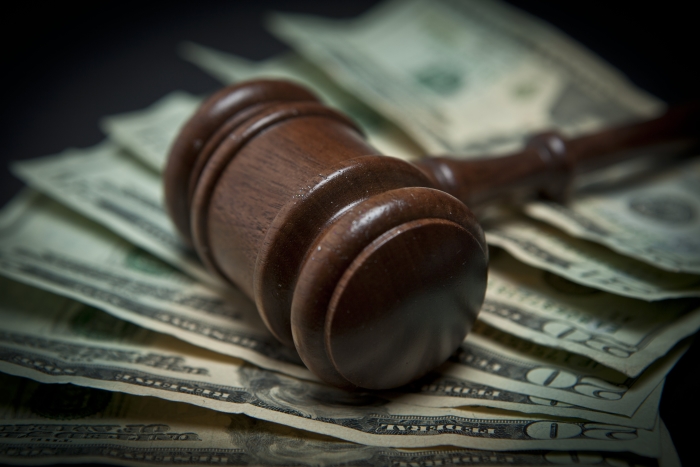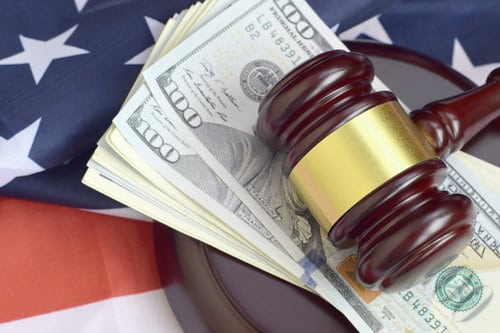
If you’ve ever asked yourself, “How do personal injury lawyers get paid?” the short answer is: they don’t get paid unless you do.
Personal injury attorneys understand that injuries are costly. Between medical treatment and unanticipated lost wages, legal fees are likely the last thing on your mind. Luckily, most personal injury lawyers refuse to charge attorney fees until your case has been settled.
But that still doesn’t explain where the costs come from or what to expect with payment. That’s why we’re here. We’re covering it all—from your final settlement check deduction to how to decipher the agreed-upon legal fees. This is everything you need to know about how personal injury attorneys get paid.
After being injured in a car accident or slip and fall, your foremost responsibility is to heal and return to life as normal. Several parties pitch in to help you reach that state, like your attorney and your medical staff. Your attorney spends countless hours building a successful personal injury case, and your medical staff works hard at making you feel good as new again. While your case is ongoing, you rarely pay for the fees associated with this work; it’s understood that your energy and resources should be focused on healing.
After a personal injury settlement has been granted, however, it’s time to compensate your legal and medical team for the work they’ve put in. On average, the total amount deducted from your total injury compensation relies on:
Let’s take a deeper look at what each of these factors means.
Attorney fees are the wages you pay an attorney for their work. They are compensation for a lawyer’s legal advice and experience, as well as payment for the time they’ve dedicated to working on your case. The attorney’s fees are generally based on the attorney’s experience and skill.

An attorney can charge an hourly or flat rate and request that payment be made while working through the case. However, most personal injury lawyers receive payment as a percentage of your final compensation amount, once your case is closed. When personal injury attorney fees are paid as a percentage of your settlement offer, it’s known as a contingency fee.
Legal costs are expenses incurred to proceed with a claim, such as a court filing fees, police report access, and copy costs for legal documents. Legal costs also include expenses necessary to build a solid personal injury claim, such as hiring expert witnesses. Most attorneys advance all court costs, meaning attorneys cover the costs as they incur and deduct the final amount from your settlement.
Alternatively, some personal injury lawyers require a small deposit towards legal costs at the beginning of your case, and they deduct the remainder from your settlement. Others may place you on a retainer agreement, meaning you pay a set amount upfront to secure the attorney’s services. Though, keep in mind that the allocation of legal costs relies on the type of case and injury claim. Regardless, if your attorney does not successfully settle or win your case at trial, you are not responsible for paying any outstanding legal costs.
A medical lien is a demand for medical expenses repayment that can be placed against your personal injury settlement.
The repayment amount is limited to the cost of the treatment or service provided. This means if you’ve been provided $10,000 worth of medical attention, the provider may only demand $10,000. A medical lien can be asserted by a healthcare provider, hospital, or individual doctor.
Your private health insurance company may also have the right to place a lien on your compensation if they’ve paid some or all of your medical bills before your claim was settled. This can include the cost of medication, therapy, or surgery. Your attorney is legally obligated to pay all outstanding medical liens to the appropriate providers before releasing your settlement check to you.
Much like your medical and legal staff, your health insurance provider expects to be compensated if they advance any medical expenses for your injury rehabilitation. In the insurance industry, this process is known as subrogation.
Essentially, your insurance company looks to recover the expenses they paid from the party responsible for your injuries. So, if you were injured in an auto accident, your provider expects the insurance company of the at-fault driver to reimburse them.
When you receive a settlement check for your injuries after your insurance provider already covered the medical expenses, you’re technically receiving payment for the same expenses twice. Thus, your insurance company expects to be reimbursed from the settlement amount you receive from the at-fault party.
Earlier we mentioned that attorneys don’t get paid unless you win your case. So, how are personal injury lawyers compensated for their time and effort? The answer lies in contingency fees and the attorney fee agreement.
A contingency fee is a total amount your attorney is awarded if they win their case. If your case is won, you receive a settlement amount. This contingency fee is a set percentage of the settlement amount.
In other words, their payment is contingent on your winning, hence the name contingency fee. If they lose your case, you receive no settlement and you owe them nothing.
A personal injury law firm’s contingency fees are listed in the contingency fee agreement. This agreement is a legal contract that defines the exact percentage of the fee and how it will be deducted.
Contingency fee arrangements make it possible for personal injury victims to afford trusted legal representation with little to no costs until the accident case is over.
The average contingency fee is based on a sliding scale that ranges between 25 and 40 percent of your settlement amount. The most common contingency fee is one-third of 33.3 percent of your settlement amount. If a case cannot be settled out of court and must be taken to trial, the contingency fee typically increases to 40 percent, to reflect the substantial amount of work needed to argue the claim in court.
During your initial consultation, you can negotiate the contingency fee basis with your attorney. This is especially true if you’ve completed prior legwork, such as filing copies of medical records or gathering the contact information for witnesses.
No, a contingency fee will not slow your settlement check timeline. Items like your attorney’s contingency fee are only deducted once a settlement amount has already been awarded. Though, all accident victims should be aware that, in most cases, the contingency fee and legal costs are deducted from your settlement first, followed by your medical liens. While these expenses do not affect your timeline, you will only receive your settlement check once your attorney, their staff, and all medical balances have been paid.
Many attorneys list their contingency fee within an attorney fee agreement. An attorney fee agreement is a legal contract that details the exact percentage of the contingency fee as well as expectations for all other incurred expenses, like who is responsible for paying legal costs in the attorney-client relationship.
Most attorney’s fee agreements state that, like a contingency fee, legal costs don’t need to be paid if you lose your case. However, be sure to read your attorney fee agreement thoroughly before signing—once you and your attorney sign, you’re both bound by its terms.
There’s no general average for how much personal injury attorneys make. The amount varies widely, depending on the lawyer’s experience, reputation, and skill in the courtroom. Likewise, an attorney’s contingency fee may increase if an accident case escalates to trial. When you consider that most personal injury attorneys are not paid unless they win the case, their total income relies on the final settlement offer. This is an incentive to work hard to ensure the insurance company or jury settles in their favor.
Some attorneys do a bit better than others in explaining their lawyer’s fees and how they get paid. However, it’s essential that you understand all attorney fee agreements before deciding to work with a law firm.
After a motorcycle accident, auto accident, or another type of personal injury claim, be sure to seek a free consultation to learn more about how you would pay your personal injury lawyer. Not only can you receive legal advice during your free case review, but you can learn more about what might be taken from your final settlement amount.